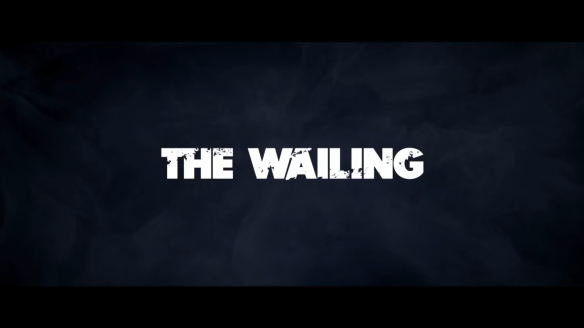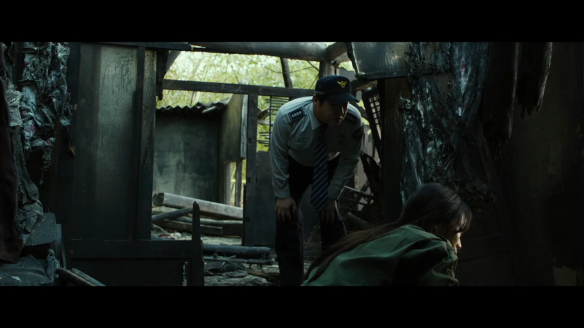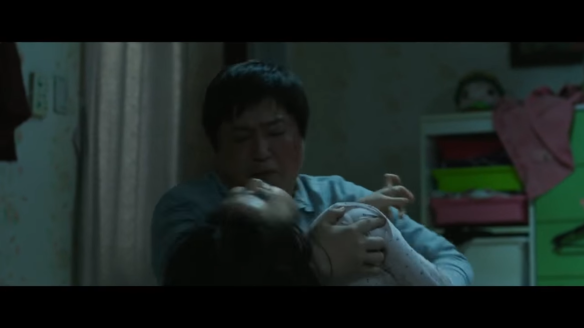
What’s in a title?
Good horror movie titles are gloriously uncomplicated, but belay so much beneath their darkened veneer. The Shining. The Exorcist. The Thing. The Haunting. The Evil Dead.
The Wailing.
The Wailing, an epic of a horror film that clocks in at around two and a half hours, has a title that recalls Shirley Jackson or perhaps even Edgar Allan Poe. But this is a relentlessly, unquestionably modern horror film, knotted and twisted with 21st century fears. It’s a film about religion, the decay of cultures and the role of a patriarch. It’s a film about the fear of the foreign and insular, wilful ignorance.
But most importantly, it’s a film about a father and his daughter.
Jong-goo is a police officer in the small mountain town of Goksung, where a variety of murderous outbreaks have occurred. Jong-goo eventually begins to suspect a Japanese stranger living in the mountains, his belief reinforced when his daughter, Hyo-Jin, appears to fall under the same possession-like trance as the other victims.
Director and writer Na Hong-Jin’s previous films have been anarchic in their narrative construction, often losing themselves in a mire of messy side characters before closing dourly and a little too succinctly. However, The Wailing’s foreground storytelling is some of his finest, driven by an admirably committed and range spanning performance from Kwak Do-won. The breadth and length of the film can seem at first overwhelming, but the melding and shifting tones keep it alive and buoyant for the entire running time. Just when things seem to be falling into a routine, Hong-Jin composes another frothing and dazzling set-piece, whether that be the most bombastic exorcism in film to date or a brief excursion into gloriously gory Sam Raimi territory.

However, The Wailing’s most effective moments concern the central father and daughter dynamic. Jong-goo is not a stoic, alpha masculine father out to save his daughter. He is clumsy and foolish. He is prone to anger and strives to a machismo he could never hope to actually achieve. But he’s also vulnerable and sad. His attempts to save his daughter are galvanised by their warm and convincing relationship early in the film, and his failings transmute from quirky and amusing to rich with genuine pathos and tragedy.
Indeed, the final act of the film is uncompromising and piercingly sad. It’s a reminder that the most effective horror films need to be more than scary, disturbing and shocking, but that they must be mature and adult in ways few aspire to be. There is nothing cheap about the denouement. It justifies the film’s length with aplomb, with the final shots sticking in the mind like shards of glass.
The Wailing is, to some extent, a film of two ideas. The central narrative thrust of Jong-goo and his daughter is one, a deeply felt story of personal responsibility and loss of control. The second is broader, more societal and existential. Jong-goo comes across three people who appear to live on the fringes of his compact village society. There is the traditional Korean shaman, who comes to exorcise Hyo-Jin of her demons. There is the Japanese man who lives in the hills, who becomes the prime suspect in the strange events that are unfolding in the town. And third, is a mysterious young woman who frequently appears to Jong-goo.
Each of these characters is mischievously and devilishly ambiguous for the vast majority of the running time, perhaps even to the point of frustration. When Hong-jin finally lays his cards on the table, the reveals initially seem baffling. But the success and satisfaction of these supporting characters comes in their thematic depth and puzzle-like nature, asking the audience to construct the truth from implication and subtlety.
What this gives the film is a beautifully empathetic look at Jong-goo, while also a touch of damnation. The complexity and opacity of these characters means that the frustration and confusion of Jong-goo is brought into sharp focus. He is a simple man with a simple desire: to protect his daughter. The existential forces at work mean nothing to him, and he believes he is dealing with the corporeal. His attempts to bully and chase and berate that which frightens and beguiles him only invites evil further into his family.
Then, once the narrative is looked at as a collective, his own arrogance and ignorance become clear. His forceful ways with the Japanese stranger, his unwitting trust in the Korean shaman, his distrust of the young woman. If Jong-goo had stopped to think and consider, he may not have made the same mistakes.
But how rational can we expect a father to be when his daughter’s life is on the line?

The Wailing also has a spiritual conflict surrounding the film, one between the traditional Korean shaman, the Catholic church and the Japanese shaman. The film treats none of them particularly kindly. The Korean shaman comes out the nastiest of them all, a cold-blooded depiction of the meeting of fake culture and capitalism. The Catholic church are pragmatists to a fault, seemingly lacking any spiritual insight whatsoever. The film has a softer depiction of the Japanese shaman, as he loses his spiritual battle to the physical battle of the angry townspeople.
The battle of the spiritual and the physical is the crux of the film, asking us to not fear the dark but to confront it with intelligence and rigour. It asks us not to accept the kind face of every monster in the shadow, and not to spit on the monstrous face of the kind stranger in the hills. When we neglect this, when ignorance and fear overcome us, we bind ourselves to our fate. But how can anyone expect any different, when we are only human, with human fears and human prejudices?
So, let’s rewind. What’s in a title? What is The Wailing?
The Wailing is the sound of confusion and despair, of being small and human and alone. Of being so determined to protect those you love against something you can’t see and can’t comprehend. It’s a sound without much form, as we lash out against others in a desperate bid to be important, or forward thinking, or to try and stop our loved ones from being afraid.
The Wailing, then, is a truly humanist horror film, using its characters to expose humanity’s insecurities and failings, while always understanding why they choose to act the way they do. The profound sadness that lies at its heart is one of empathy and the wish that people could see beyond themselves, even if just for a moment.